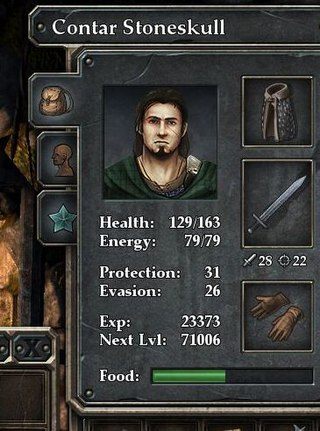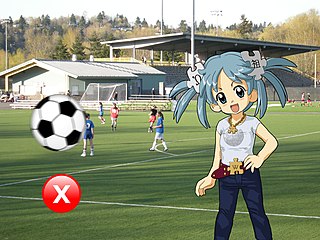This article relies largely or entirely on a single source .(December 2022) |
In video games, a scripted sequence is a pre-defined series of events that occur when triggered by player location or actions that play out in the game engine.
This article relies largely or entirely on a single source .(December 2022) |
In video games, a scripted sequence is a pre-defined series of events that occur when triggered by player location or actions that play out in the game engine.
Some scripted sequences are used to play short cutscenes that the player has little control of. However, they are commonly used in games such as Half-Life or Call of Duty to bring in new enemies or challenges to the player in a seemingly surprising manner while they are still playing. They can also present further plot points without interrupting the player and making them watch a cutscene. The intended results of this style of presentation is to increase immersion and to maintain a smooth-flowing experience that keeps the player's interest.
Scripted sequences trigger a number of things. A timer, a checkpoint or the progress of the game could activate a scripted sequence. For players that speedrun video games, skipping these scripted sequences that would otherwise slow down their completion time requires skill, and being able to manipulate the game's hit boxes so that the game does not trigger a sequence is necessary for fast completions.
Half-Life uses scripted sequences throughout the game (aside from one short cutscene). Walking near other characters can trigger scripted sequences such as dialog. These dialog sequences tell the game's story in a different manner and are sometimes there simply for entertainment purposes.
Gears of War uses scripted sequences between sections of game play to provide objective reminders and tell the game's story without the use of cut scenes. The game triggers a playable scripted sequence once all of the enemies have been cleared in an area, usually these sequences play while the player moves to the next area.
Resident Evil 4 has many examples of scripted sequences that utilize a quick time event to feature more action-packed game play. As the player navigates the level, they must react to the event to continue.
Games such as Call of Duty have been criticized for their reliance on these sequences, as many feel they tend to guide a player through a game by the invisible hand of the developers, blocking progression with invisible walls until the scripted sequence has triggered further progression. [1] Also, the use of scripted sequences may diminish replay value as the surprise effect is negated upon subsequent play-throughs.

A player character is a fictional character in a video game or tabletop role-playing game whose actions are controlled by a player rather than the rules of the game. The characters that are not controlled by a player are called non-player characters (NPCs). The actions of non-player characters are typically handled by the game itself in video games, or according to rules followed by a gamemaster refereeing tabletop role-playing games. The player character functions as a fictional, alternate body for the player controlling the character.
Script may refer to:

Final Fantasy Chronicles is a compilation of Square's role-playing video games Final Fantasy IV (1991) and Chrono Trigger (1995), released for the North American Sony PlayStation on July 2, 2001. TOSE ported both titles from the Super Nintendo Entertainment System; each had been previously released as individual Japanese PlayStation ports in 1997 and 1999. Several bonus features were added to each game, such as art galleries, bestiaries, and cutscenes—including computer-generated imagery full motion video used at the beginning of Final Fantasy IV and anime scenes used throughout Chrono Trigger.
A campaign is a continuing storyline in a game. In role-playing games, it is a set of adventures. In video games, it may be a linked series of quests designed to tell a complete story.

An experience point is a unit of measurement used in some tabletop role-playing games (RPGs) and role-playing video games to quantify a player character's life experience and progression through the game. Experience points are generally awarded for the completion of missions, overcoming obstacles and opponents, and successful role-playing.

Wing Commander is a media franchise consisting of space combat simulation video games from Origin Systems, Inc., an animated television series, a feature film, a collectible card game, a series of novels, and action figures. The franchise originated in 1990 with the release of video game Wing Commander.

Replay value is the potential of a video game or other media products for continued play value after its first completion. Factors that can influence perceived replay value include the game's extra characters, secrets and alternate endings. The replay value of a game may also be based entirely on the individual's tastes. A player might enjoy repeating a game because of the music, graphics, gameplay or because of product loyalty. Dynamic environments, challenging AI, a wide variety of ways to accomplish tasks, and a rich array of assets could result in a high replay value.

Vampire: The Masquerade – Bloodlines is a 2004 action role-playing video game developed by Troika Games and published by Activision for Microsoft Windows. Set in White Wolf Publishing's World of Darkness, the game is based on White Wolf's role-playing game Vampire: The Masquerade and follows a human who is killed and revived as a fledgling vampire. The game depicts the fledgling's journey through early 21st-century Los Angeles to uncover the truth behind a recently discovered relic that heralds the end of all vampires.
An interactive film is a video game or other interactive media that has characteristics of a cinematic film. In the video game industry, the term refers to a movie game, a video game that presents its gameplay in a cinematic, scripted manner, often through the use of full-motion video of either animated or live-action footage.

Witchaven II: Blood Vengeance is a fantasy-themed first-person shooter for DOS compatible operating systems released in 1996 by Capstone Software. It is a sequel to 1995's Witchaven. Both games use the Build engine. It was Capstone's last proprietary game before they and their parent company Intracorp went bankrupt. In Witchaven II, the player controls the returning knight Grondoval, the hero of the first game, as he is trying to stop an evil witch from carrying a titular blood vengeance in revenge for him having slain her sister in the original game. It received generally negative reviews, with criticism directed at its controls, enemy AI, and general mediocrity as compared to other first-person shooters coming out at the time. The game is supported by the BuildGDX source port.

In video games, a level is any space available to the player during the course of completion of an objective. Video game levels generally have progressively increasing difficulty to appeal to players with different skill levels. Each level may present new concepts and challenges to keep a player's interest high.

A quest, or mission, is a task in video games that a player-controlled character, party, or group of characters may complete in order to gain a reward. Quests are most commonly seen in role-playing games and massively multiplayer online games. Rewards may include loot such as items or in-game currency, access to new level locations or areas, an increase in the character's experience in order to learn new skills and abilities, or any combination of the above.

Panzer Dragoon Saga, known in Japan as Azel: Panzer Dragoon RPG, is a 1998 role-playing video game (RPG) developed by Team Andromeda and published by Sega for the Sega Saturn. The third entry in the Panzer Dragoon series, it replaced the rail shooter gameplay of the previous games with RPG elements such as random encounters, semi-turn-based battles and free-roaming exploration. The player controls Edge, a young mercenary who rides a dragon and encounters a mysterious girl from a vanished civilization.

In video games, a quick time event (QTE) is a method of context-sensitive gameplay in which the player performs actions on the control device shortly after the appearance of an on-screen instruction/prompt. It allows for limited control of the game character during cut scenes or cinematic sequences in the game. Performing the wrong prompt, mistiming the action, or not performing any action at all results in the character's failure at their task, resulting in a death/failure animation and often an immediate game over or the loss of a life, with some games providing a lesser but significant penalty of sorts instead.

A gravity gun is a type of device in video games, particularly first-person shooters using physics engines, whereby players can directly manipulate objects in the world, often allowing them to be used as projectiles against hostile characters. The concept was popularized by the gravity gun found in Valve's Half-Life 2, as well as the Temporal Uplink found in Free Radical Design's TimeSplitters: Future Perfect; although a similar concept was used by id Software during the production of the earlier game Doom 3, eventually leading to the introduction of a physics-based weapon in the expansion pack Resurrection of Evil. Later games, such as Portal, BioShock, Crysis, Dead Space, and Garry's Mod have been influenced by the success of these physics-based weapons, adopting their own styles of comparable abilities or weapons.

A dialogue tree, or conversation tree, is a gameplay mechanic that is used throughout many adventure games and role-playing video games. When interacting with a non-player character, the player is given a choice of what to say and makes subsequent choices until the conversation ends. Certain video game genres, such as visual novels and dating sims, revolve almost entirely around these character interactions and branching dialogues.
An adventure game is a video game genre in which the player assumes the role of a protagonist in an interactive story, driven by exploration and/or puzzle-solving. The genre's focus on story allows it to draw heavily from other narrative-based media, such as literature and film, encompassing a wide variety of genres. Most adventure games are designed for a single player, since the emphasis on story and character makes multiplayer design difficult. Colossal Cave Adventure is identified by Rick Adams as the first such adventure game, first released in 1976, while other notable adventure game series include Zork, King's Quest, Monkey Island, Syberia, and Myst.
This is a non-comprehensive list that includes terms used in video games and the video game industry, as well as slang used by players.

A cutscene or event scene is a sequence in a video game that is not interactive, interrupting the gameplay. Such scenes are used to show conversations between characters, set the mood, reward the player, introduce newer models and gameplay elements, show the effects of a player's actions, create emotional connections, improve pacing or foreshadow future events.

Alien Odyssey is an action-adventure game developed by Argonaut Software and published by Philips Media in 1995. The game features a mixture of first-person and third-person gameplay, with sequences involving shooter, adventure and puzzle mechanics. Alien Odyssey makes use of 3D rendering and full motion video cutscenes which were developed using the developer's proprietary B-Render graphics software. Upon release, the game received a mixed reception, with reviewers praising the visual presentation of the game, whilst critiquing the game's inconsistent mixture of game modes and short length.